Thailand: AWP & Alliance LTD - E-Meeting and E-Litigation in Thailand

E-Meeting and E-Litigation in Thailand
The Thai Government has recently announced the new rules on the electronic meeting of the companies and electronic proceedings of litigation in order that the business and legal activities can continue and, at the same time, follow the new-normal standard to prevent the spread of Covid-19.
E-Meeting
Prior to the Announcement of the Head of the National Council for Peace and Order No. 74/2557 dated June 27, 2014 (the “NCPO Order”), the attendees in shareholders or board of directors’meeting in Thailand were required to physically present at the meeting. Later, the NCPO Order allowed companies to convene electronic meeting (“E-Meeting”) provided that all of the attending persons must be in Thailand by the time of the meeting and at least one third of the quorum must attend the meeting at the same place.
In light of the social distancing measures, including lockdown and international travel limitation, to prevent the spread of covid-19, the Thai Government recently issued the new law called the Emergency Decree for Electronic Meeting B.E. 2563 (AD 2020) dated April 18, 2020 (the “Emergency Decree”) to eliminate the restriction on place of meeting and to be more flexible. By the effect of this Emergency Decree, attendees can join the meeting via any electronic means including telephone or video conference from any part of the world, however, provided that the E-Meeting must comply with the security standard of the Ministry of Digital Economic and Society (“MDES”), the criteria of which are as follows:
Notice of the meeting or meeting documents can be served to the attendees via electronic means;
- System for verification of identity of the attendees, i.e. username and password, must be provided to the attendees before the meeting starts;
- E-Meeting must allow all attendees to cast their votes either openly or secretly;
- Except for confidential meeting, audio or visual recording of the entire meeting must be taken
- All electronic traffic data, e.g. usernames, data and time of login and logout of all attendees shall be collected as evidence; and
- All audio and/or visual recording and traffic data are regarded as parts of the minutes of meeting, however, the minutes shall still be prepared in writing.
Electronic Litigation (E-Litigation System)
In response to the COVID 19 pandemic, the President of the Supreme Court published the Regulation on the Electronic Procedures B.E. 2563 (AD 2020) (the “Regulation”) dated September 30, 2020, to facilitate the court proceedings and to avoid any delay during the lockdown. The Regulation allows the following court proceedings to be conducted through electronic means (“E-Litigation”):
1) Filing, sending, receiving of documents via e-mail or any other electronic methods (E-Filing);
2) Case hearing, witness examination, witness statement recording via the Electronic Hearing Recording System (E-Hearing) which can be conducted in whole or in part of the case subject to the discretion of the court; and
3) Issuing judgement or order, and signing arrangement by the court can be conducted in electronic forms.
In addition to the foregoing, this Regulation also provides that the evidences in electronic form are admissible in the trial, however, the court shall consider the trustworthiness of such evidences based on their nature, generating process, completion of data, and other circumstances.
To conduct the E-Litigation, the court may order at its discretion or upon request from the party by taking into account of the convenience and affordability of the party whose accessibility to technology is limited.
If the party wishes to proceed this E-Litigation, he/she will be required to file a motion to the court indicating the reason of necessity such as health conditions of the party and/or the witness, the difficulty of transportation to the court, or effect from Covid-19 pandemic. Although the Regulation is applied to all court of justice in Thailand, the availability of the E-Litigation is subject to the readiness in terms of electronic system and procedures of each court.
Authors
Worawut Anupornwattanakij
Krittin Pollagan



